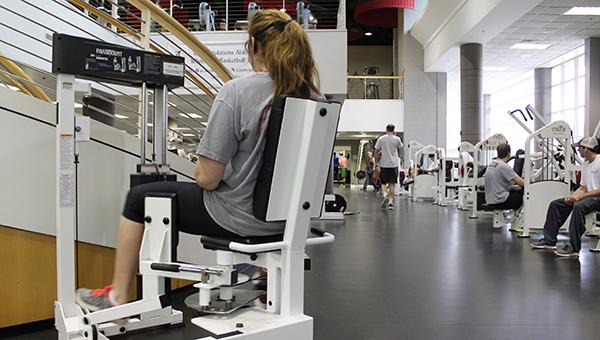“As high as the tuition is already, they should be throwing them in for free,” said John Dugdale, a sophomore majoring in finance.
Previously, the University Recreation Center offered both smaller workout towels and larger shower towels upon request at no cost to patrons. Under a new policy which became effective Jan. 5, patrons who wish to use shower towels must purchase them for $4 each.
Ryan Wyatt, a junior majoring in finance, said though he prefers to use the smaller workout towels, which will remain free of cost, he is angered by the new policy.
“I think it’s ridiculous,” he said. “As a student we pay for enough already.”
George Brown, executive director of University Recreation, said students are not the only ones who are upset by the new policy. The change in policy came as a result of budgetary necessity.
“The only reason was budget,” he said. “The sheer volume of towels that we were having to purchase and repurchase to maintain this service, coupled with a budget that was pretty tight and continues to be pretty tight, just proved to be a very unsustainable operation.”
Andre Love, director of University Recreation Programs, said a large number of towels are lost or damaged throughout the semester, which became a problem of sustainability.
“For whatever reason the towels disappear,” he said. “There’s a service we’ll ask for the towels, and usually by the time we make it through the semester, between the laundering of them, they are pretty beat up. With the loss also, some that are being stolen or misplaced, it’s a combination of those things.”
Brown said the intent of the new policy is to only be temporary, and University Recreation is already in the process of developing a better system. He said he is working alongside Love and Kristin Durham, director of University Recreation Services, to create an alternative to the new policy.
“What we are doing right now is we are analyzing for the remainder of at least the spring semester, perhaps even the summer,” Brown said. “We are looking at this reduction in service and we, in that time, feel like we can give ourselves some time to not only save our budget, quite frankly, but secondarily we can research ways that maybe we can reinstitute it and bring it back.”
Brown said one of the options they are considering is a for-fee service which would allow patrons to pay a certain fee per month in order to have swipe-in access to a clean shower towel upon each visit to the Rec Center.
Durham said this potential system would work similarly to the current membership check-in process, and would likely be on a monthly basis.
“If you paid that fee for a month, your action card would be activated, you could swipe at the equipment desk and get a towel, and then turn it back in to be laundered,” she said.
Though University Recreation has begun planning for a new towel system, Brown said what is valued most is student opinions.
“We are very anxious and hoping to get some patron feedback in the coming months on this,” he said. “We are anxious to see two things: whether people are willing to pay for a towel service, and if so, at what price.”
Brown encouraged students to offer their opinions on possible towel rental policies through the student affairs website’s complaint portal or through contacting University Recreation directly.
“Students are a very powerful catalyst for change, and we appreciate that,” he said.
Brown said the University Recreation hopes to make an announcement of their new policy plan by this summer.
Presently, Rec Center patrons still have free access to workout towels upon request, and can purchase a shower towel from the equipment desk for $4, which can be paid for with cash, credit card or BamaCash.









